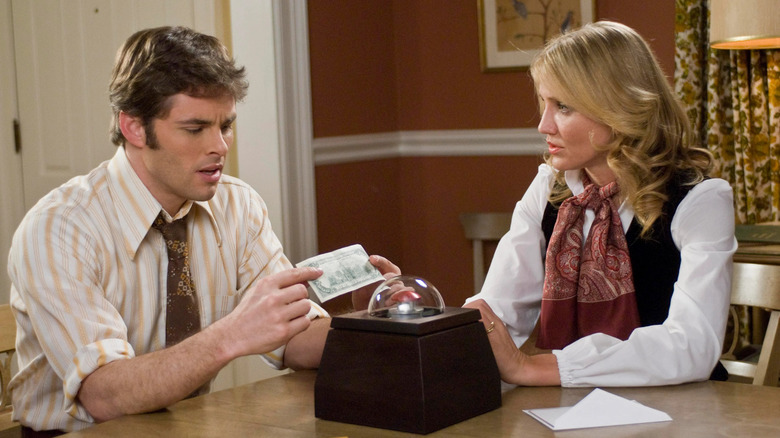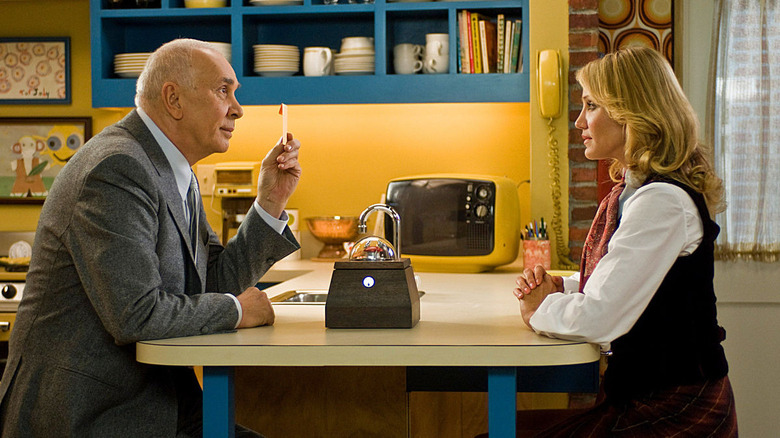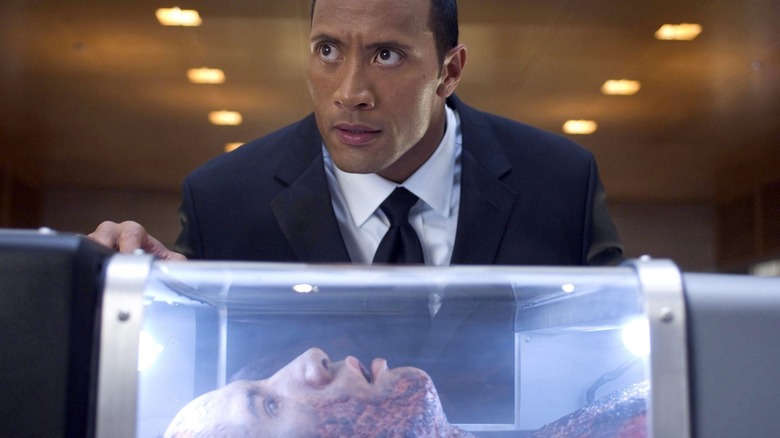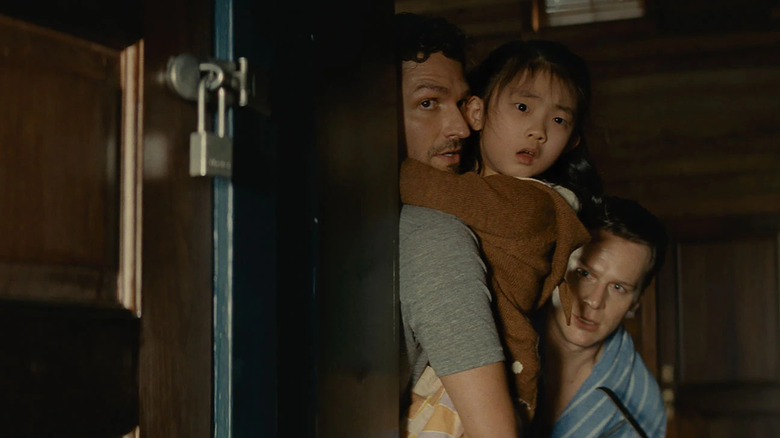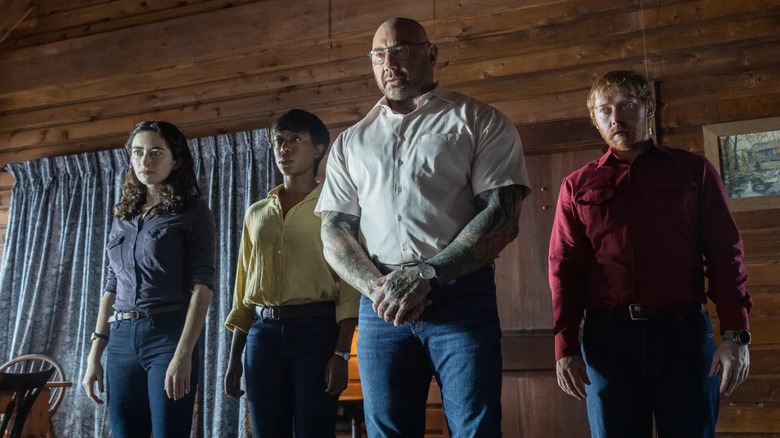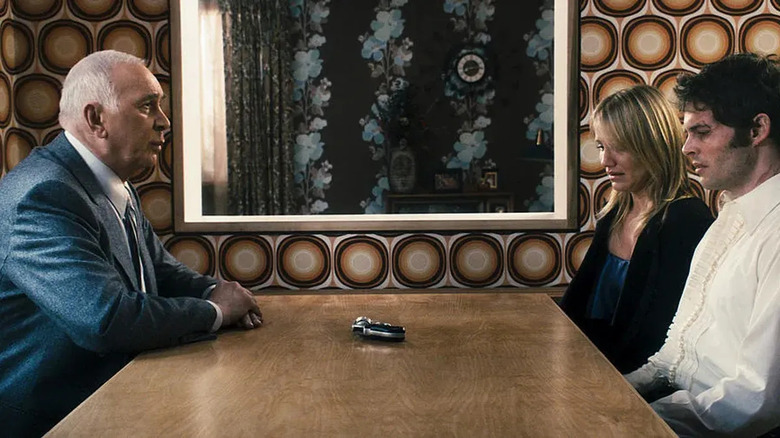If You Enjoy M. Night Shyamalan's Knock At The Cabin, You'll Love The Box
Quick, name this movie: a loving married couple and their only child are living their happy, quiet, domestic life when someone acting on behalf of otherworldly forces knocks on their door, insinuating themselves into their lives and giving them an ultimatum that results in the couple being forced to choose who in their family is to be sacrificed, lest terrible occurrences ensue.
If you said that describes M. Night Shyamalan's latest movie, "Knock at the Cabin," you'd be correct. If, however, you said that describes Richard Kelly's 2009 film "The Box," guess what? You'd also be correct!
Of course, in terms of character, setting, and beat-by-beat plot, the two films have nothing to do with each other, so this isn't an attempt to accuse anyone of plagiarism. Yet it's undeniable that both movies share a common theme and tone, so much so that if you happen to see "Knock at the Cabin" this weekend, or if you're already a fan of "The Box," you owe it to yourself to check the other out, as the two films make wonderfully thought-provoking companion pieces.
Button, button, who'll press the button?
"The Box" is an adaptation of author Richard Matheson's 1970 short story entitled "Button, Button," a story as devilishly clever as it is brief. In it, a mysterious figure named Mr. Steward offers an economically troubled married couple the chance to receive a large sum of money if they'll press a button inside a nondescript box, at which point someone they don't know will die. The wife eventually decides to press the button, and soon after her husband mysteriously dies. The money arrives as an insurance settlement, and the wife is told that perhaps she never really knew her husband.
Kelly's film takes the short story and its concepts much further than anyone would have expected, surpassing even the prior screen adaptation of Matheson's story by director Peter Medak (of "The Changeling" fame) for a 1986 episode of "The Twilight Zone" revival, which featured a new ending where Mr. Steward informs the couple that the box will be reprogrammed and the deal offered to someone who neither of them knows, implying they could be the next victims.
In "The Box," the ethical dilemma shared by Norma (Cameron Diaz) and Arthur Lewis (James Marsden) is only just beginning after Norma decides to press the button, and the mysteriously deformed Arlington Steward (Frank Langella) takes the box back, awards them the $1 million that he'd promised if they pressed the button, and warns them that the box is to be reprogrammed, as in the '86 version's ending. From there, the film follows the couple as they uncover what appears to be an international-cum-interstellar conspiracy to test the human race via the box experiment, one which reaches an endgame, not unlike the central dilemma of "Knock at the Cabin."
It's time for The Kellyaissance
To date, Richard Kelly has only directed three feature films: 2001's "Donnie Darko," 2006's "Southland Tales," and "The Box." His debut, of course, became a cult phenomenon shortly after its initial release, capturing the imaginations of people in dorm rooms, and message boards, and it remains a cult classic to this day. "Southland Tales" was generally reviled upon its release, seen as a troubled film at best and a nonsensical mess at worst. Within the last few years, however, the movie has had the benefit of riding a pretty substantial wave of positive reappraisal, with more and more folks revisiting the movie and its alternate "Cannes Cut" thanks to theatrical screenings and a spiffy Arrow Video Blu-Ray release.
Given Kelly's relatively minuscule filmography, one has to wonder why "The Box" has yet to receive similar treatment, especially since it's been 14 years since its release, and Kelly has hinted that he's interested in producing a director's cut. There's no doubt that, like the rest of Kelly's work, "The Box" is a lot to take in, and on top of that it's unequivocally the bleakest of all his films.
It's a predicament that "Knock at the Cabin" director M. Night Shyamalan must identify with — while Shyamalan has made more films than Kelly, he also spent a period of his career in "director jail" for making one too many box office flops, and he certainly has a long history of critical ups and downs. Even the feedback for "Knock at the Cabin" so far is already wildly divisive, which is one of the reasons why filmmakers like Shyamalan and Kelly are so admirable: if nothing else, they swing for the cinematic fences.
Playing with the limits of genre
"The Box" and "Knock at the Cabin" adventurously manipulate classic genre structures and tropes, giving the audience a new experience while letting them revel inside an old-fashioned one. "The Box" takes place in December of 1976, a setting that right off the bat makes it a riff on the Christmas movie. Indeed, holiday decorations and snowy streets abound within the film, and Richard Kelly makes use of cheerful holiday trappings such as someone in a Santa Claus costume to further subvert expectations and contrast against the bleak goings-on.
Primarily, however, "The Box" emulates the tone and structure of a '70s conspiracy thriller: the scenes featuring Arthur investigating Steward's connection to NASA recall Alan J. Pakula's "All the President's Men," and Norma and Arthur's seemingly normal suburban existence being infiltrated by eerie, otherworldly forces carries with it overtones of "The Stepford Wives" and "Invasion of the Body Snatchers." Finally, the original score by Win Butler, Réginé Chassagne, and Owen Pallett is written in a style that recalls the works of Bernard Herrmann, both his legendary scores for Alfred Hitchcock and his '70s output for the likes of Brian De Palma ("Obsession") and Martin Scorsese ("Taxi Driver").
Similarly, "Knock at the Cabin" sees Shyamalan take the cinematic grammar of the home invasion horror movie (a la "The Strangers," "Funny Games," et al) and then combine it with the disaster movie and pandemic movie, as the group of invaders led by Leonard (Dave Bautista) grimly insist that the apocalypse will occur if married couple Andrew (Ben Aldridge) and Eric (Jonathan Groff) do not sacrifice one of their family members, including adopted daughter Wen (Kristen Cui). Shyamalan was so committed to giving his film old-school thriller vibes, he purposely shot the movie on antiquated lenses.
A pair of personal films at heart
As fun as it is watching Kelly and Shyamalan deliver classic cinematic thrills, what lends "The Box" and "Knock at the Cabin" added depth and dimension is their personal relationship with their respective filmmakers. Both movies were made to please a wide demographic of audience members, to be sure, but they harken back to an era of popular filmmaking that focused more on personal expression over franchise and brand-building.
In "The Box," the setting of Virginia in 1976 is no accident, as it was during that era that Kelly's real-life parents, Lane and Ellis, lived in the state. Kelly's script gives Arthur his father Lane's old job of designing camera equipment for NASA, and part of Norma's backstory is inspired by his mother Ellis' struggles with a deformity caused by malpractice. Throughout the film, there are elements big and small of Kelly's nostalgia for the period, conflating warm childhood memories with ominous fictional elements.
For Shyamalan, "Knock at the Cabin" is the filmmaker's response to the events of the last several years, adapting Paul Tremblay's source novel into a unique new vision. While Shyamalan's film career exploded thanks to the success of 1999's "The Sixth Sense," he'd made two movies prior to that one: 1992's "Praying With Anger" and 1998's "Wide Awake," both of which deal with issues of religion. "Knock at the Cabin" is arguably Shyamalan's most spiritual movie since 2002's "Signs," an assessment the director appears to agree with when describing the movie. "It's a modern-day biblical story," he explains in the film's official press kit. "The idea of telling large-scale biblical stories, but in modern times and in modern settings, is resonating with me right now."
Cinematic social experiments
Where "The Box" and "Knock at the Cabin" overlap the most is in their "Twilight Zone"-inspired moral and ethical parables. Both movies present their characters with a dilemma that strikes at the tension between logic and belief, as well as the struggle between selfishness and altruism.
In "Knock at the Cabin," Leonard and his compatriots continue to insist that Andrew and Eric must make a sacrifice if the human race is to be saved; the only alternative if they choose not to make a choice is that they'll survive in a ruined world devoid of other people. In "The Box," the endgame for pressing the button turns out to be Norma and Arthur's only child, Walter (Sam Oz Stone), being stricken blind and deaf by Steward's supernatural powers. Steward gives the couple one last test: one of them can choose to sacrifice the other, allowing Walter to regain his senses and keep the money in a trust fund for his use. Alternatively, they can keep the money for themselves and go on living with a newly disabled son.
The resemblance between these life-and-death ethical quandaries and psychological exercises makes each film into a sort of cinematic depiction of a social experiment, a quality that Shyamalan and Kelly lean into by providing no concrete and correct "answer." In "Knock," the relationship between any sacrifice made and seemingly natural apocalyptic events in the world can be seen as either supernaturally entwined or incredible coincidence, In "The Box," the free will behind Norma and Arthur's choices is cruelly manipulated by Steward and his associates, causing the couple's fortunes to sour before they're asked to press the button, and the passing on of the box to a new couple just as Norma and Arthur are asked to make a sacrifice calls into question whether or not they ever had a choice at all.
Fortunately, you, dear reader, are spoiled for choice: whether you choose to see "Knock at the Cabin," "The Box," or both, you're in for a memorably engaging time.
